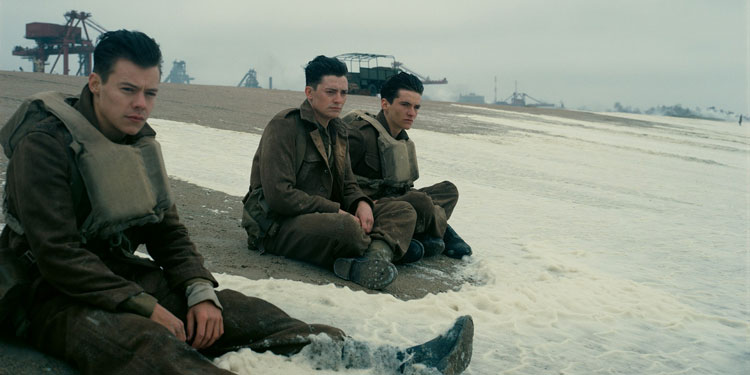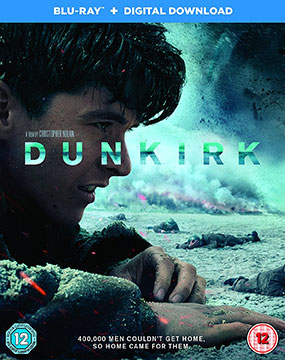
Director: Christopher Nolan
Running Time: 106 mins
Certificate: 12
Release Date: December 18th 2017 (UK)

Christopher Nolan is one of the few directors who can pretty much make any movie he wants. Thanks to the success of unconventional big budget movies such as Interstellar and Inception – and of course The Dark Knight trilogy – Warner Bros. trusts him to deliver. On the surface Dunkirk seems a more straightforward proposition as it’s a World War II movie, but as this is Nolan, he’s not going to make a war film quite like anyone else.
For a start there’s remarkably little dialogue and while there are main characters, we learn comparatively little about them. Likewise, while it’s about an incredibly famous event, it’s not interested in being an exposition-heavy historical overview, complete with officers pushing little boats around a war-room map to explain to us what’s going on. Instead it’s a film that wants to create a sense of realism about the events it’s talking about. It also has an almost puzzle-box nature – three intercut stories each taking place at a slightly different time – helping to create a sense of the chaos and uncertainty for those caught up in the events of late Spring 1940.
By the time the movie starts, the Germans have swept into France and have pinned the Allied forces into a small beach area in the French town of Dunkirk. 400,000 men are trapped, waiting for the German troops to pick them off or force their surrender – and if that happens, it could well mean the Germans win the war. The film follows the story from land, sea and air. Tommy (Fionn Whitehead) is a young soldier on the beach, looking for a way across the English Channel, but finding that those higher up seem uncertain what to do.
In the air are two Spitfire pilots (including Tom Hardy), who are amongst the few the RAF send to protect the 100,000s of men. Then on the sea is the Moonstone (captained by Mark Rylance), one of the hundreds of ‘little boats’ – just normal civilian craft with no guns or protection – pressed into service to head to Dunkirk and bring the soldiers back.
In some respects, the movie feels more like a drama documentary than a typical film. Indeed, it avoids so many touchstones of the stereotypical World War II drama that there are times when it’s more like sci-fi or something post-apocalyptic than what you’d expect from the recreation of a historical event. It’s remarkably effective in ensuring it feels visceral and modern to the audience, instead of being something that’s attempting to preserve the past in aspic. It also helps to give thing an oddly propulsive force, shifting your perception of what you’re seeing.
One of the keys to this is Hans Zimmer’s score, which is pretty much constant from the opening seconds to the end credits. It creates a great sense of unease, and also underlines the almost sci-fi approach. Indeed, Zimmer’s score often echoes the likes of Vangelis’ Blade Runner music more than the classic war movie scores of the past, except for some conscious hat-tips to Nimrod from Elgar’s Enigma Variations (it probably wasn’t a coincidence Zimmer must have been working on Dunkirk around the same time as he was composing for Blade Runner 2049). It’s all extremely well done and helps create an emotional crescendo by the movie’s end.
Perhaps the smartest thing about Nolan’s script and direction is how well it gives a sense of the grand scale of what’s going on through the people it follows. We learn comparatively little about them – to the point some have bemoaned its lack of characterisation – but we know enough that they really do start to represent something greater than just themselves. Most war movies want their soldiers to represent all the soldiers faced with a similar situation, but few do it in a way that’s this compelling. Coupled with Nolan’s usual technical virtuosity, Dunkirk is quite an achievement.
The film also continues Nolan’s love of shooting on big format film, with nearly 80-minutes of the movie shot with IMAX cameras and the rest on 65mm film. The Blu-ray has been carefully mastered to ensure it brings out the richness that this lends to the movie. It’s a film that could easily have looked drably monochromatic, but the film formats used and the attention paid to the colour depth of the HD transfer ensure it looks great. The soundtrack is also impressive, making full use of the surround elements to put you in the middle of the chaos, while also giving your bass a bit of a workout.
Although the special features list looks like a plethora or featurettes (which it is), it’s put together in a way that pull it into one feature-length documentary about the making of the movie. It’s well worth a watch, especially to see how much was done in-camera, as well as the sheer scale of putting the movie together.
Overall Verdict: I’ve often felt many of Nolan’s other films were over-rated, but Dunkirk is a genuinely impressive war movie.
Reviewer: Tim Isaac
Leave a Reply (if comment does not appear immediately, it may have been held for moderation)